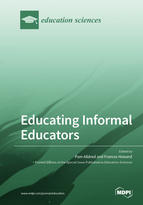Educating Informal Educators
A special issue of Education Sciences (ISSN 2227-7102).
Deadline for manuscript submissions: closed (1 June 2021) | Viewed by 49324
Special Issue Editors
Interests: sexualities and sexual health; gender politics and diversity; parenting, and education for equality with young people, children and the professionals who work with them
Special Issues, Collections and Topics in MDPI journals
Special Issue Information
Dear Colleagues,
As Youth & Community Work courses in Higher Education dwindle across the UK, following years of austerity and cuts to Youth Services, the diverse pedagogies of informal education are more needed than ever. Any society that values learning and recognises learners’ diversity needs these approaches. This special issue will focus on how informal education pedagogies, practices and principles are engaged with, modelled, taught or shared in Higher Education.
'Educating Informal Educators' draws on the range of expertise in Higher Education courses across the UK and seeks to emphasise the value of informal education, its values and practices not only for students of education or informal education, but for society as a whole. This special issue seeks to capture the particular pedagogies of youth and community work courses that sustain distinctive informal education practice. Contributions will be invited covering (and not limited to) the following themes:
- Critical pedagogy
- Group work/self-directed learning
- Digital Youth work
- Anti-oppressive practice
- Collaboration / co-production of knowledge
- Placements / experiential learning
- Residentials / Accompaniment
- Detached youth work
- Impact & measurement
- Creativity / improvisation
- Building relationships / relational learning
- Cultural difference, gender, race, class
- Social pedagogy
We are looking to bring together for the first time a series of articles that celebrate the distinctive contribution of youth & community work pedagogues to the development of informal education pedagogies. With a social justice orientation, this special issue will reach beyond that of young and community work courses and extend towards engaging students in valuable perspectives and pedagogies for wider society.
Prof. Dr. Pam Alldred
Dr. Frances Howard
Guest Editors
Manuscript Submission Information
Manuscripts should be submitted online at www.mdpi.com by registering and logging in to this website. Once you are registered, click here to go to the submission form. Manuscripts can be submitted until the deadline. All submissions that pass pre-check are peer-reviewed. Accepted papers will be published continuously in the journal (as soon as accepted) and will be listed together on the special issue website. Research articles, review articles as well as short communications are invited. For planned papers, a title and short abstract (about 100 words) can be sent to the Editorial Office for announcement on this website.
Submitted manuscripts should not have been published previously, nor be under consideration for publication elsewhere (except conference proceedings papers). All manuscripts are thoroughly refereed through a double-blind peer-review process. A guide for authors and other relevant information for submission of manuscripts is available on the Instructions for Authors page. Education Sciences is an international peer-reviewed open access monthly journal published by MDPI.
Please visit the Instructions for Authors page before submitting a manuscript. The Article Processing Charge (APC) for publication in this open access journal is 1800 CHF (Swiss Francs). Submitted papers should be well formatted and use good English. Authors may use MDPI's English editing service prior to publication or during author revisions.
Keywords
- Youth work
- Critical pedagogy
- Social pedagogy
- Informal education
- Experiential learning






